by Kurt Scholle
Local Marketing Tactics
The Importance of Optimizing for "Near Me."
After reading this article, you will know:
- Why "near me" search queries have exploded in recent years and how to benefit from them.
- The two key components of "near me" local queries are what is being offered and exactly where.
- How to optimize your site for "near me" queries.
- How to save time on local marketing listing management, both DIY and DFY.
Are you ready for some local marketing for small business tips? Read on!
Does your restaurant, gift shop, hardware store or other local business have enough foot traffic?
Could you use some more business?
"Near me" search volume is exploding!
The reason? These searches are being heavily driven by the proliferation of people using smartphones, especially when they're used as the primary method of local search. Near me searches have become a critical issue in Local SEO and organic traffic.
Did you know that 76% of people who search for a nearby business on their smartphones visit them within a day’s time?
Or that 28% of these searches end in a purchase?
That’s the power of local SEO – and local keyword research.
Google has been working toward producing more localized search results.

According to Google, between April 2016 and 2018, searches for the term "near me now" grew by 150%. There was also a 900% growth for the term "near me today/tonight" and a 200% increase in searches including the terms "open" + "now" + "near me".
Today, Google takes a more local-first approach when ranking search results. It favors businesses with a local listing in proximity to the person conducting the search.
That means local businesses should be able to rank for much more competitive and generic queries with local intent, such as [bakery] or [florist].
I was doing keyword research for a new client who wants to improve their rankings for local search terms related to restaurants and their location or service area.
For the purpose of this article, let's say this restaurant is a fast-food restaurant specializing in Chicago-style hotdogs in Lombard, IL, which is about 20 miles west of Chicago. This applies to other restaurants and retailers, as well.
For restaurants, it's important to optimize for their location, such as "Downers Grove, Illinois" or "Northwest Indiana" and their menu items, such as burgers & fries, Chinese, kosher, vegan or seafood.
The location does not need to be part of the query. Google needs to know what you serve and where.
"best burgers near me"
"seafood restaurants near me in Northwest Indiana"
"Chinese food near Door County, WI"
We might narrow it down further and create content related to menu specifics, like Chicago-style hotdogs, pastrami on rye, fresh-cut fries, aged and marbled steaks, and in one case, Tandoori Chicken, biryani and naan!
Have you ever had Lamb Biryani with Caramelized Onions?
O-M-G! (Maybe I should be a food blogger?)
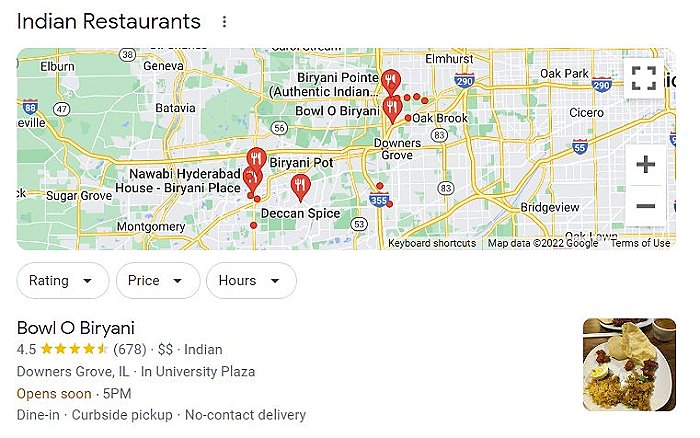
Restaurants would also want to optimize for terms like "carry out," "delivery," "fast food," "fine dining" and others. Think of all the situations and needs of your clients and what they might search for. What are their most frequent requests or questions?
As I was looking for keyword ideas, I stumbled across WordStream's Most Popular Keywords lists, including Business and Consumer keywords, Sales and Marketing keywords and Health & Wellness. They must have 100 different lists of everything from B2B to gardening keywords to credit cards and debt - even coffee keywords.
WordStream is one of the popular keyword tools I've written about previously.
One of the things that struck me was the number of keywords that contained the words "near me," "near by," or "around me." We've seen them for some time, but they seem to have increased.
39 of the 100 keywords contained the words "near me." If you add "around me," "local," "near my location," "nearby," "close by," "in my area," and "nearest," slightly more than half are location related.
We found similar keywords in other niches: "apartments for rent near me," "homes for sale near me," "university near me for nursing," "hotels near me," "cheap hotels near me," "hotels nearby," "plumbers near me," and so it goes.
How to Pick the Right Local Keywords
First, the objective is to pick the search queries your prospects will use to find a business like yours and match them with local municipalities or regions; such as "best bed and breakfast in the Smokey Mountains." Then make sure you have content on your site that supports that query - why are you the best B&B? Share testimonials, and even better, link to websites that cite you as a quality, or even the BEST bed and breakfast in the Smokies.
Other examples might include; "Best florist in Shinhopple, NY," or "Best restaurant in Superior, Wyoming."
We have more examples search terms that include a product or service with a specific location. Would you like to see them?
- 1"DUI attorney in Truth or Consequences, New Mexico."
- 2"Podiatrists in Big Foot, Texas
- 3"Best bakery in Cookietown, OK"
- 4"Hotdogs in Ketchuptown, SC"
- 5"Urologist in Pee Pee, Ohio"
- 6"Undertakers in Tombstone, AZ"
- 7"Obstetricians in Breeding, KY"
- 8"Breakfast near me in Two Egg, AZ"
- 9"Pest control in Bug Tussle, KY."
- 10"Investment Advisor in Wealthy, Texas"
The two key components of local queries are what is being offered; legal advice, scones, yoga classes, pest control, electrical supply, bongs or someone who can help manage your lottery winnings.
The other component is a defined service area. Where are your prospects looking for you?
In my location, they might search in 'Downers Grove,' but they might also want to go into the city to have a meal or see a show and use 'downtown chicago' as the local modifier.
When my wife and I traveled to Texas to visit her brother and his wife, we wanted some authentic tex-mex, so before we even left, we Googled a number of terms, like 'authentic tex-mex near haltom city texas,' which returned a number of directory and review sites, such as Yelp, Trip Advisor and YellowPages. (More on that in a minute.)
We were also served links to individual restaurants.
As we planned our trip, we looked up what events might be happening during our stay.

In this example of looking for events in a particular location, among other things, you get the option to filter by Today, Tomorrow, This Week, This Weekend and Next Week.
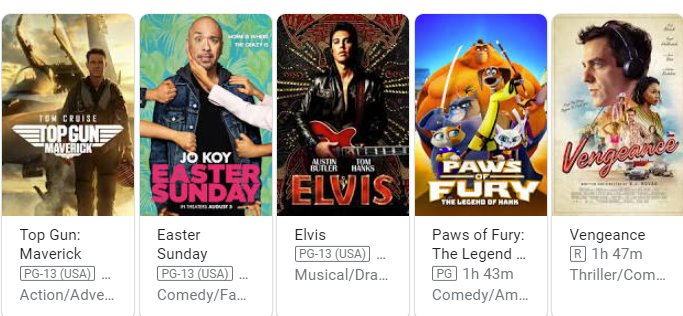
We searched for movies near Haltom City and got the usual directory listings: Yelp, Fandango and YellowPages, but we also discovered the charming one-screen Haltom Theater.
There are 202,000 monthly searches on the term "movie theater near me." There are 165,000 monthly searches for "hair salons near me." "Dentist near me" gets searched 111,000 times a month.
People often search for brands; 'a walmart near me,' 't mobile near me,' 'near me kfc,' 'near me jewel osco.'
More examples of local search marketing queries: 'train near me,' 'gym naperville,' 'near me electrical supply,' 'near me jobs,' 'near me laundromat,' 'near me oil change,' 'near me park.'
It doesn't matter if the query begins with 'near me' or ends with it. Just so it includes it.
'Near me park' would be a great example of someone using a mobile device while they are out and about. We've worked with a lot of retailers on keywords for people currently behind the wheel. Keep in mind that Googlebot is actually twins, one crawls for desktops, the other indexes mobile content.
One other piece of advice: It's still worthwhile to target queries that show 0 volume in keyword research tools. These phrases may have 0 volume but can still lead to conversions and impressions.
"Near me is not a band-aid for local search!!! Near me is NOT a bandaid
- it's a nuance optimize for city and state too!" - Carrie Hill

How to optimize for "near me" queries?
Unlike optimizing for particular products or services, you do not try to optimize for the "near me" keyword, which might seem counter-intuitive. If it's a part of so many Internet searches, why wouldn't you?
Any content you create supporting that query would look funny.
You want to be optimized for individual products or services you offer and you want the search engines and local directory sites to know exactly where you are.
That's where the local directories and review sites come in.
Are you surprised that the #1 influencer of local rankings is Google Reviews? Native Google reviews correlate quite highly with local search success.
The number of customer reviews on 3rd party sites, like Yelp or TripAdvisor don't appear to have nearly the same influence, but they can be good drivers of foot traffic that might, in addition to ringing the cash register, lead to new reviews on your Google Business Profile. (Previously Google My Business)
Your first step to Website Success is to claim and optimize your Google Business Profile.
The Importance of a Good NAP
No, not that kind of nap!
NAP is an acronym for Name, Address and Phone. It's important to format this information consistently across all online properties. Make sure it's formatted EXACTLY as it is in your Google Business Profile.
Make sure you have this same exact information on a Contact page. (Google will actually penalize you for not having a Contact page.)
Read more about how to attract local customers here. Learn how to express and format your information to maximum advantage.
Are your local business listings complete and accurate?
So many search engines and apps use information they have simply scraped from online sources. Google My Business started that way and some of the results were mind-boggling. This led to inaccurate addresses, map listings, phone numbers and store hours.
Claiming these listings corrects that information, which improves everything from Yelp listings and Bing rankings to Apple maps. Your business will be listed in more places with better information.
You will also have a competitive advantage.
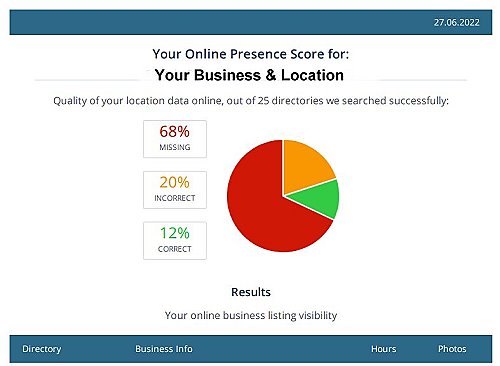
Only 19% of businesses on Google respond to reviews. Solid review management increases discoverability and drives more engagements. It's also a key to better performance using voice search.
What should you put in a local search listing?
Business Name: Not necessarily your legal business name, but how your customers know you. Ziggy's Bagels, not Cohen Restaurant Group LLC. What's on the sign outside?
Physical Address: I recommend contact your post office for their format.
Phone Number, Hours of Operation, Logo
Website Address
Images of the location, products and key customer-facing employees.
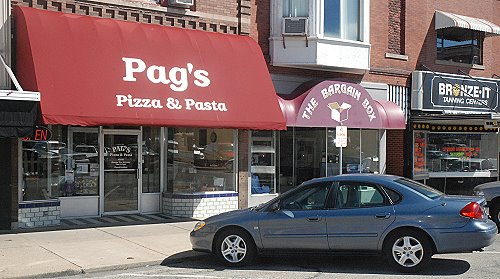
Which local search directories should you claim your business in?
- Google Business Profile is the biggest and the best and it fuels Google local searches. They also have the highest Page Authority at 98.
- Facebook Business Pages are free and also have PA of 98.
- Yelp(PA 86) because it is a top review site, and not just for restaurants.
- Bing Places for business because Bing is the 2nd largest search engine.
- YP.com and Whitepages because they supply information to other directories and review sites.
- *MerchantCircle offers a free listing option in categories like real estate, health and beauty, professional services, home & garden, automotive and legal & financial.
- *Thumbtack list local professionals in painting, house cleaning, local moving, wedding service and electronic repair.
- *Angi, (formerly Angie's List) is great for providers of home services, including HVAC, roofing, plumbing, electrical, pest control and carpentry in 700 service categories.
- Your local Chamber of Commerce because it's a dominant and trusted business directory.
- The same might be said of a listing with the Better Business Bureau.
- *OpenTable for restaurants.
- *FindLaw for legal professionals. They claim 11 million searches per month.
- Superpages is one of the oldest online directories.
- Foursquare because their dat is shared with other sites and directories.
- Hotfrog.
* Some of these directories are best used for advertising your services and may not affect your 'near me' search traffic.
By the way, there are HUNDREDS of citation websites around the world, not just the United States.
Local Marketing for Small Business Tips
1- Refer to local landmarks, neighborhoods, well-know stores or legendary restaurants. Are you located near a local park, train station, amusement park, shopping mall, museum, intersection, etc? Work it into your site's content.
2-Add written driving directions from those local landmarks to your location. It might get you in the coveted Local 3-Pack section on the Google SERPs.
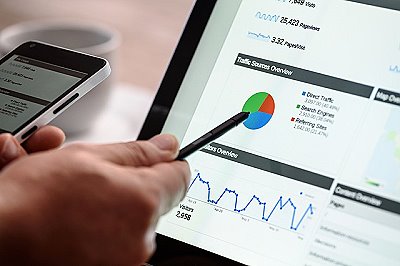
3-Refer to local landmarks, neighborhoods, well-know stores or legendary restaurants. Are you located near a local park, train station, amusement park, shopping mall, museum, intersection, etc? Work it into your site's content.
4-Add written driving directions from those local landmarks to your location. It might get you in the coveted Local 3-Pack section on the Google SERPs. "Greek restaurants in Cincinnati."
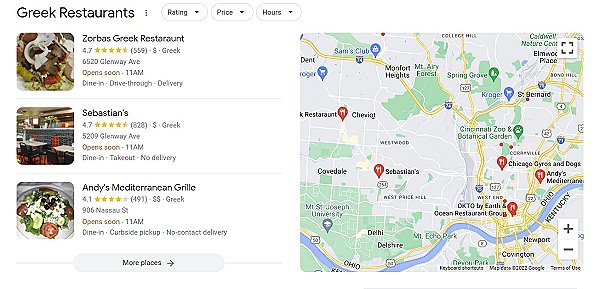
5-Use a Sitemap. XML sitemaps help search engine spiders index your site. Help them index your site by cross-linking pages and blog posts to pick up the strategic content mentioned above.
6-Use Schema. Schema is a way to format site content that makes it easier for search engines to index. (More on Schema coming in a future post.)
Local Marketing Listing Management
Managing your listings and reviews is ESSENTIAL to your local marketing. Claiming and optimizing 25 or 50 or 200 different properties would be time consuming.
Fortunately, there are tools available to help do that.
The one we use most is MOZ Local for local listing management. They have a free online presence tool to help you check the accuracy of your business listings. Their service is really affordable. Get started here.
Frequently Asked Questions About Local Marketing
Q1: Are there alternatives too MOZ Local? Yes, a dozen or more provide local listing management! You might look into SEMRUSH, Yext, Bright Local and Reputation, among others.
Q2: What Is Hyperlocal Marketing? Hyperlocal marketing is the process of targeting prospective customers in a highly specific, geographically restricted area, sometimes just a few blocks or streets, often with the intention of targeting people conducting “near me” searches on their mobile device.
Hyperlocal marketing’s primary purpose is to drive foot traffic to physical locations and capitalize on near-me searches, which have strong commercial intent. (Source: WordStream)
Hyper local marketing can be executed with paid ads, as well.
Q3: How important are reviews for an effective local marketing campaign? A recent survey says that 88% of people are likely to trust online reviews just as much as they would trust personal recommendations from peers.
Q4: How long does it take for local marketing to kick in? You can begin to see some benefits within a week or so, but as with anything search-related, some benefits will take time. First, you must update your content; text, images and cross links. It takes time for your new citations to get crawled and it will take time for Google to rank your content.




